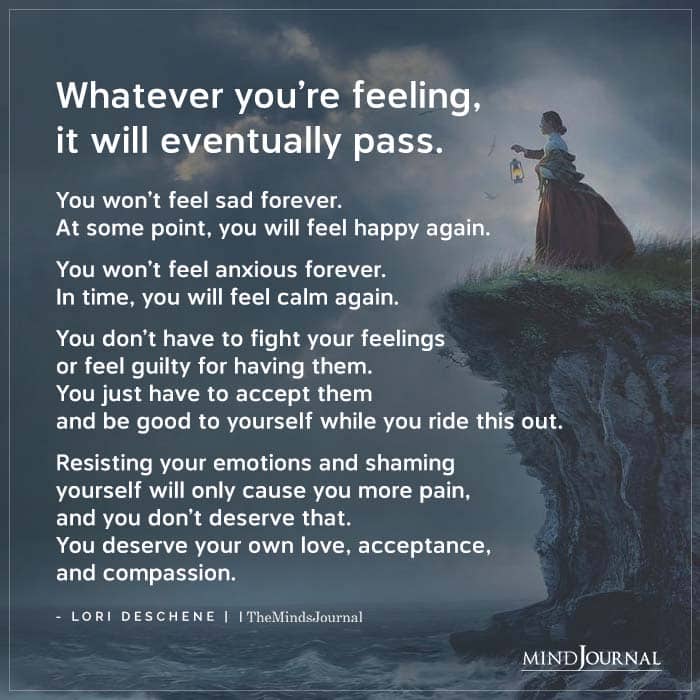Unhappiness is a part and parcel of life, and so is healing from it. Dealing with your emotional pain and acknowledging your distress can be a tough experience, but one thing that can help you heal is compassionate self awareness.
Key Points
- Being unhappy can cause you to see everything in a negative light.
- Choosing to acknowledge your distress is an important step toward healing.
- Developing compassionate self awareness can help you nurture happiness.
Feeling extremely unhappy can make anyone see the world through gray-tinted glasses. It darkens your view of what’s going on at any moment, causing you to be negative and pessimistic and to feel miserable. Unable to see light or happiness anywhere you look, you might assume that you actually want to feel unhappy. But there is another way of seeing this—a way of seeing it with understanding and compassion.
All too often, when people feel distressingly unhappy, the idea of feeling good in any way, shape, or form does not feel possible. So, rather than trying to do the impossible—taking action to feel better—unhappy people do what feels more natural. They react with a defeated and negative mindset.
And they often find themselves behaving self-destructively—perhaps gorging at the buffet table or overindulging at the bar. Bad feelings about yourself might even cause you to lash out in anger at people you love and respect. But even as the bad choices add up, it doesn’t mean that you want to make things worse for yourself.
When you look closely at those behaviors, you can see how they are about either expressing current despair or impulsively grabbing onto fleeting pleasures in an effort to feel better. Things like spending all day playing video games might actually be an effective soothing experience—for a short time.
But ultimately, such behavior can cause you to ignore friends or avoid paying attention to your hygiene or basic housekeeping. Over time, these behaviors actually make your life worse in ways you may not fully realize.
Related: 7 Signs You Need Emotional Healing
Understanding Your Pain
But if you are able to perceive and consciously acknowledge what’s going on with you (to be mindful of your experience), that insight can actually help free you. It can be the first step out of the dark gray shadow of your hopelessness.
It’s important to understand that choosing to acknowledge your distress is very different from just knowing it is there. Often, when efforts to deny their distress fail, people have a sense of it forced upon them. When this happens, such awareness can feel crushing.
But that’s not the same as choosing to acknowledge and accept your distress, which can have a very different effect. With that acknowledgment and acceptance, you can begin a journey toward healing. Instead of desperately trying to escape your pain by avoiding it or grabbing onto immediate pleasures, acceptance can help you find inner calm even as you experience difficult circumstances.
Really acknowledging distress means opening yourself to the hurt. And it is important to understand that being in emotional pain (or “feeling bad”) does not mean there is something wrong with you (or that you “are bad”). Rather, unhappiness is part of the human experience.

Opening to Change
For true healing to start, you must learn to consciously open yourself to emotional pain without beating yourself up with criticism. As you endure painful feelings, you need to practice persistently redirecting your harsh self-assessment. Consider how the pain you are feeling makes sense given your situation (including your history, which might make you particularly sensitive to current circumstances).
In doing this, you will be nurturing compassionate self awareness. I’m sure you would agree that others would deserve compassion when facing a similar struggle. You are no different. Understanding how your actions make sense when considering your inner experiences is a process called mentalizing (learn more about it in this brief video).
If you have self-compassion as you allow for your unhappiness, it will eventually reach a high-water mark, even if, at first, the intensity may seem to rise uncontrolled within you. This means that as long as you do not harbor thoughts or take actions that maintain that intensity, it will eventually ebb like a receding storm tide.
Related: Self-Compassion And Meeting Yourself Where You Are
Compassionate Self Awareness Enables Healing Actions
Then, with compassionate self awareness, you might find that you can choose to take action to help yourself feel better, even if you don’t feel particularly motivated to do so. You might start with some concrete resolutions: by folding normally enjoyable activities into your life, socializing more with friends, being sure to get sufficient sleep, eating healthy, or making it a point to exercise, your chances of becoming happier have a good start.
Though it might not seem like it as you get started, these conscious, positive steps will increase the probability that you will become truly happier.
There are no guarantees. But, with repetition over time and compassionate self-awareness, you are very likely to feel their positive effects. You may find that your gray glasses have been replaced with clear lenses, or maybe even rose-tinted ones.
Want to know more about how compassionate self awareness can help you heal? Check this video out below!
To see more from Dr. Becker-Phelps, visit her website and her YouTube Channel. Website link: http://drbecker-phelps.com/home/ YouTube link: youtube.com/c/LeslieBeckerPhelpsPhD
Written By Leslie Becker-Phelps
Originally Appeared On Psychology Today










Leave a Reply